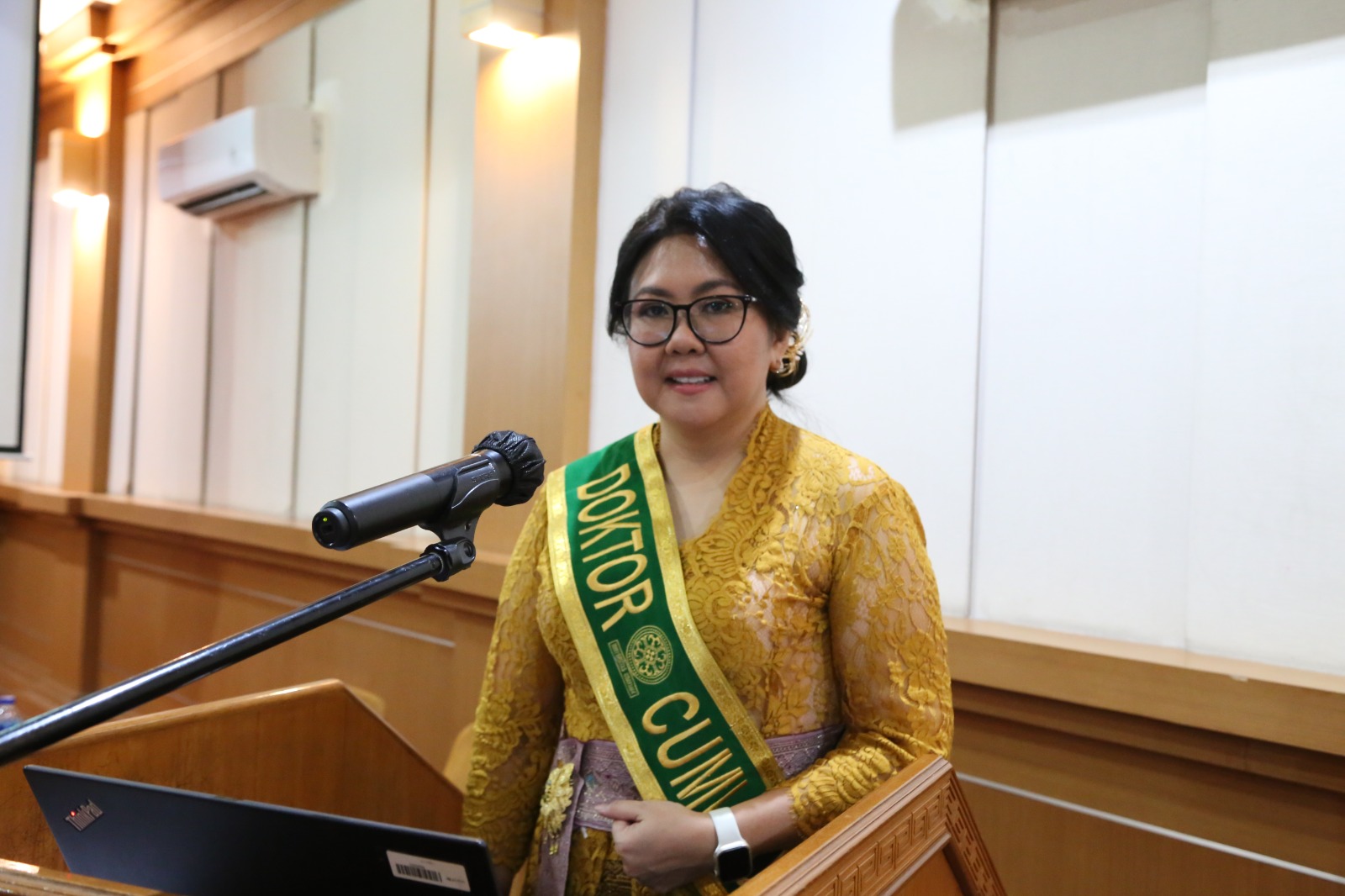Doctor of Medical Sciences Develops Peer Volunteer Assistance Model to Increase Therapy Adherence for HIV Positive Pregnant Women
Doctor of Medical Sciences Develops Peer Volunteer Assistance Model to Increase Therapy Adherence for HIV Positive Pregnant Women
Located in the graduate courtroom lt. III, Denpasar Postgraduate Building, the Doctoral Promotion exam has taken place with the promovenda candidate, dr. Artha Uliyanti Camellia, MHA, MPH with the dissertation title "Model of Assistance by Peer Volunteers Based on Predisposing, Enabling, Reinforcing Factors and Social Support Theory to Increase Knowledge, Perception and Adherence of ARV Therapy in HIV Positive Pregnant Women in Kupang City." (23/6/2023)
HIV/AIDS is still a public health problem in the world, including in Indonesia. 38 million people living with HIV (ODHIV) worldwide, and 50% are women where around 1.8 million children are living with HIV and there are at least 150,000 new HIV cases in children. Every year in Kupang City, as many as 6,154 (70%) pregnant women are tested for HIV, and as many as 15-18 are diagnosed with HIV (prevalence 0.28-0.3%). However, treatment coverage and adherence rates are still low (19%). The purpose of this study was to develop a mentoring model to improve treatment initiation and medication adherence by peer volunteers in HIV-infected pregnant women. This study identified the inhibiting and motivating factors using the Predisposing, Enabling, Reinforcing Factors and Social Support Theory approaches.
The research design is mixed methods using a sequential exploratory approach. Qualitative research was conducted on HIV-infected pregnant women, peer caregivers and health workers. The results of the qualitative research form the basis for preparing the assistance format used as an intervention. Low knowledge of mothers about the benefits of ARVs; difficulties in accessing ARVs in terms of time and cost; lack of complete administration (KTP, KK, BPJS); stigma from oneself and the surrounding environment and health workers; and the difficulty of procedures in carrying out treatment in health services are the main obstacles. The need for pregnant women for psychosocial support in overcoming doubts about the benefits of ARVs, the importance of social support, the desire to stop taking medication, and appreciation for their success in adhering to undergoing treatment are important components which are then used in the preparation of mini-counseling as part of the assistance provided.
The intervention was carried out on the entire population of pregnant women during July 2022 – February 2023 as many as 9 pregnant women and compared to controls of 31 HIV Positive Pregnant Women from 2020-2021 data at 11 Community Health Centers in Kupang City (secondary data). Assistance is carried out for 6 (six) months following a format that has been prepared including an initial assessment, 3 times mini counseling, and a final assessment to measure changes in knowledge, perceptions, attitudes towards family support and compliance.
Bivariate analysis showed an increase in medication adherence, knowledge, family support, good perceptions of the companion's attitude, good perceptions of the attitudes of health workers, perceptions of the benefits of treatment, and initiation of ARV treatment in the intervention group. Multivariate analysis showed that the psychosocial assistance model and the perception of the companion's attitude had a dominant and significant effect on increasing adherence to ARV therapy. Structured psychosocial assistance is 6.5 times more likely to increase adherence to ARV therapy and perceptions of the companion's attitude are 4.6 times greater to increase adherence to ARV therapy. Social Support Theory as an intervention for HIV Positive Pregnant Women is proven to be able to increase motivation, social support and self-acceptance so that mothers can undergo ARV treatment during their pregnancy. Counseling sessions that are integrated with routine antenatal care (ANC) checks can minimize loss to follow-up and ensure that mothers comply with HIV treatment and care because continuous ARV therapy can suppress the HIV virus until it is undetectable and prevent transmission from mother to child. .
The novelty of the research (Novelty) is the formulation of a structured and integrated mentoring model based on Predisposing, Enabling, Reinforcing Factors and Social Support Theory based antenatal services conducted by peer volunteers for HIV Positive Pregnant Women to increase knowledge, positive perceptions, and adherence in carrying out ARV treatment during pregnancy. This research also results in the development and adaptation of the theories of Predisposing, Enabling, Reinforcing Factors and Social Support with the aspirations of the participants which are more theoretically comprehensive.
The implications of the results of this study are the proven importance of a structured, systematic and integrated mentoring model in antenatal care to increase adherence to taking ARVs in HIV positive pregnant women. This model can be used to overcome the inhibiting factors and strengthen the motivating factors for HIV positive pregnant women in accessing and undergoing treatment. This mentoring model is an alternative that can be applied in primary health care to increase the effectiveness of programs to prevent transmission of disease from mother to child, so that children are not infected with HIV.
The exam was led by the Deputy Dean for General Affairs and Finance Dr. dr. I Made Sudarmaja, M. Kes., with a team of examiners:
1. Dr. dr. Ketut Tuti Parwati Merati, Sp.PD-KPTI., FINASIM (Promoter)
2. Prof. Dr. dr. I Made Bakta, Sp.PD-KHOM (Co-promoter I)
3.Dr. dr. Dyah Pradnya Paramita Duarsa, M.Si (Co-promoter II)
4. Dr. dr. I Nyoman Mangku Karmaya, M.Repro., PA(K)
5. Prof. Dr. dr. I Made Jawi, M. Kes
6. dr. I Made Ady Wirawan, S.Ked., MPH., Ph.D
7. Dr. dr. A A. Wiradewi Lestari, Sp.PK(K)
8. dr. Pande Putu Januraga, M.Kes., Dr, PH
9.Dr. dr. A A. Ngurah Jaya Kusuma, Sp.OG., Subsp.K.Fm., MARS
10.Dr. Luh Seri Ani, SKM., M.Kes
While academic invitations are:
1.Dr. dr. Anak Agung Sawitri, MPH
2.Dr. dr. Luh Putu Ratna Sundari, S.Ked., M.Biomed
3.Dr. Ni Ketut Sutiari, SKM., M.Sc
4.Dr. dr. Made Agus Hendrayana, M.Ked
In this exam, Dr. dr. Artha Uliyanti Camellia, MHA, MPH., was declared to have graduated as the 387th Graduate Doctor of the Doctoral Degree in Medical Sciences, Faculty of Medicine, Udayana University with the Cumlaude predicate.





